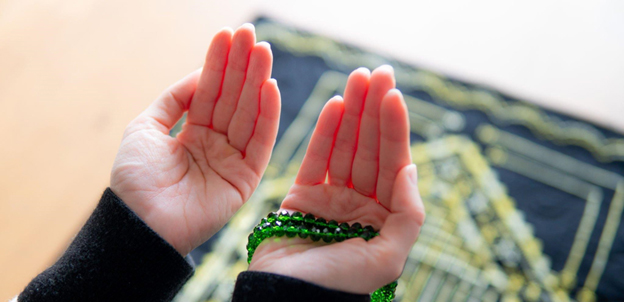
Dua e Qunoot is also referred to as dua qunoot or qunoot dua. It is a special supplication that is mentioned in the hadith. Dua e Qanoot is often recited and known for it’s connection with the Witr Salah. It is frequently repeated with Witr salah. The Dua e Qunoot is one of the important components for completing your salah. Our Prophet Muhammad (PBUH) taught us in many virtues including humility and loyalty to Allah Swt, when the Dua e Qunoot has been recited.
What is Dua e Qunoot?
According to the Dua e Qunoot "Qunoot" is a term that means “obedience” or “standing” In Islam. The Arabic word Dua is for “Supplication”. We recite Dua e Qunoot while standing in the last rakat of Witr prayer before bowing. You have to read it in Witr which is Sunnah. Dua e Qunoot is a Witr Dua and it is a special supplication taught by our Prophet (ﷺ) in his Hadith.. This Dua is the Sunnah or mustahab (recommended) to recite during Witr according to the hadith.
What is Witr Salah?
A Rakat at the end of Nawafil after Esha prayer is called Witr Salah. (Bukhari 1137, Muslim 1766) Witr is Sunnah and not obligatory. (Tirmazi 453)
When to Recite Dua e Qunoot?
- Dua e Qanoot in Witr is confirmed by Prophet SAWW before Bowing. (Bukhari 1002)
- It is not proven that the hands are not raised for Qanoot Witr. (Nisai 1514)
- Prophet SAW recited Dua e Qunoot after Ruku. (Bukhari 1002)
- It is proven that Ibn Masood RA raised his hands by his actions. (Tohfa tul Ahwazi 2/580)
What is the time of Witr Salah?
On the authority of Sayyid Na Abu Saeed RA, that Nabi SAWW said: "Read Witr before Dawn" (Muslim 1764). Sayyidna Jabir RA says that the Prophet SAWW said " Whoever fears at night that he will not be able to get up at night should recite Witr in the first Esha. And whoever hopes that if he wakes up at the end of the night then he should recite witr at the end of the night because the night prayer is such that Angels are present in it and it is Afzal" (Muslim 1766)
1. Dua e Qunoot in Arabic
Narrated by Al-Hasan ibn Ali is the grandson of Prophet Muhammad SAWW. He said he was learned by the Prophet SAWW to say the dua e Qunoot in Arabic as follows:
اللّهُمَّ اهْدِنِي فِيمَنْ هَدَيْتَ وَعَافِنِي فِيْمَنْ عَافَيْتَ
وَتَوَلَّى فِيمَن تَوَلَّيْتَ وَبَارِك لِي فِيمَا أَعْطَيْتَ
وَقِنِي شَرَّ مَا قَضَيْتَ إِنَّكَ تَقْضِي وَلَا يُقْضَى عَلَيْكَ
وَإِلا نَّهُ يَذِلُّ مَنْ وَالَيْتَ وَلا يَعِزُّ مَنْ عَادَيْتَ
تَبَارَكْتَ رَبَّنَا وَتَعَالَيْتَ
Reference
- Narrated by Abu Dawood 1425
- Al-Tirmidhi 464
- Sun'un Nasai 1746
Dua e Qunoot Transliteration
Allahumma ahdini feeman hadayt, wa aafini fiman afait, wa tawallani fiman tawallait, wa barikli fima atait, wa qini sharra ma qadait, fa Innaka taqdi wa la yuqda Alaik, wa innahu la yazillu man o walait, walla ya izzu man aadait, tabarakta Rabbana wa taalait.
Dua e Qunoot in English
O Allah guide me among those You have guided, grant me security among those You have granted security, befriend me among those You have befriended, bless me in what You have granted, and save me from the evil that You command. Indeed You decree and none can pass a decree, and no one can pass a decree upon You. Indeed he is not crushed whom You have befriended. Blessed are You our Lord and honored.
2. Dua e Qunoot in Arabic
اللّهُمَّ إِنِّي أَعُوذُ بِرِضَاكَ مِنْ سَخَطِكَ وَيَمُعَافَاتِكَ مِنْ عُقُوبَتِكَ وَأعُوذُ بِكَ مِنْكَ لَا أَحْصِي ثَنَاءً عَلَيْكَ انْتَ كَمَا أَثْنَيْتَ عَلَى نَفْسِكَ
Reference
Abu Dawud: 1427, Tirmidhi : 3566, An-Nasa’i: 1748, Ibn Majah: 1179
Transliteration
Allahuma inni aao'odhu biridhuaka min sakhatika wa bimua'a fatika min ooqubatika wa aao'dhu bika minka la ohsi sanaa ann alaika anta kama asnaita ala nafsika.
Dua e Qunoot in English
O Allah! I seek refuge in Your satisfaction from Your anger and Your forgiveness from Your punishment and I seek refuge in You from You. I cannot count on your praise. You are as you praise yourself. Abu Dawud: 1427, Trendy: 3566, An-Nasa’i: 1748, Ibn Majah: 1179
Which Due Qunoot is correct
According to Ibn Uqayl al-Hanbali (may Allah have mercy on him) What is mustahab in his view is that which was narrated by al-Hasan ibn ‘Ali from the Prophet Muhammad SAWW “Allahumma ihdini feeman hadayt....”. But if one adds to that the words narrated from Abu dawud and Tirmidhi “allahumma inni a'udhu bi ridhaka…”. There is nothing wrong with that. Both are according to the Hadith. Is Dua e Qanoot from the Quran? No. Dua e Qanoot is not from the Quran. It is the Sunnah of our beloved Prophet Muhammad SAWW.
Online Quran Classes
Do you want your kids and youngsters to learn more about Online Quran Classes? Then sign up on our website for more information about the Online Quran Classes program and learn the Holy Book of Allah. Online Arabic classes for children and adults to improve their Arabic language. So we hired Arabic teachers, Tajweed Teacher, Quran Tarjama and Tafseer teachers, Islamic studies teachers and online Quran Tutors as well.


